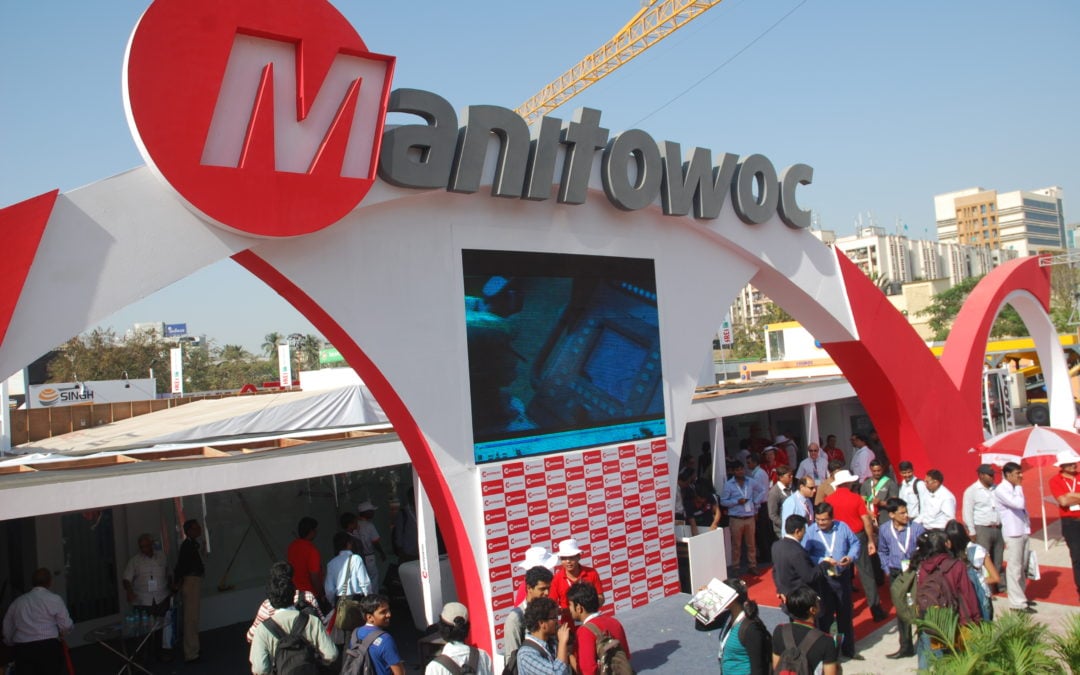
Manitowoc has been hit by lower oil prices. In the past year, demand has dropped for its rough-terrain cranes and boom trucks from energy-related customers. Photo: Bill Gozansky/Alamy
Manitowoc has been hit by lower oil prices. In the past year, demand has dropped for its rough-terrain cranes and boom trucks from energy-related customers.Photo: Bill Gozansky/Alamy
Despite the difficult environment, newly independent Manitowoc (ticker: MTW) is worth a look.
The industrial crane maker was formed about a month ago, when its parent, Manitowoc, broke into two companies, spinning off its food-service equipment business as Manitowoc Foodservice(MFS). The breakup, long anticipated, had first been championed by activist firm Relational Investors, and, more recently, by investor Carl Icahn, who owns about 8% of the new Manitowoc.
In the wake of the March 4 spinoff, shares of the less cyclical food-service business have risen 7%, and Manitowoc has gained 6% to a recent $4.30. While the crane market is expected to log another weak year, Manitowoc’s shares look undervalued. They could shoot higher over the next few years.
The company’s new CEO, Barry Pennypacker, a turnaround expert, plans to restructure the business and improve margins. His initiatives could lead to higher profitability, even if demand remains subdued. Improving markets would give the shares a lift.
Manitowoc, based in Manitowoc, Wis., has a strong franchise and generates plenty of cash, even at trough earnings levels. While updated financials won’t be released until later this month, the balance sheet appears manageable.
Management has guided for debt levels of 2.1 times this year’s depressed Ebitda—earnings before interest, taxes, depreciation, and amortization—which could come in around $120 million. On net debt, leverage might be lower, though Wall Street estimates vary.
In a March 14 report, one of the few bulls on the stock, Jefferies analyst Stephen Volkmann, estimates net debt at $80 million, or 8% of total capitalization. That reflects a decent cash position.
On his estimates, the stock trades for an enterprise value of 30% of sales, well below the 40% that comparable businesses usually fetch in a trough. At a peak, the figure can go as high as 120% for deep cyclical businesses, implying substantial upside as the crane market rebounds. Volkmann values the shares at $5.50.
THE OLD MANITOWOC had operated a couple of businesses. It expanded its food-service equipment operation in 2008, with the purchase of U.K.–based Enodis. The same year, it sold its shipbuilding division.
Manitowoc is a global leader in cranes and makes about 50% of its sales internationally. It sells mobile telescopic, tower, and lattice-boom crawler cranes under the Manitowoc, Potain, and National Crane brands. With an installed base of 140,000 cranes, the company generates about 20% of its revenue from aftermarket parts and services, which is a less cyclical business.
In 2013, the last up year, the business generated $2.5 billion in sales, well above this year’s expected $1.8 billion. Most analysts carry a Hold on the shares. For 2016, they see earnings coming in at 10 cents a share before rebounding to 18 cents next year, on better margins and slightly higher sales.
Manitowoc has been hit by lower oil prices. In the past year, demand has dropped for its rough-terrain cranes and boom trucks from energy-related customers. In the December quarter, sales fell 18%, from the year-earlier level. One bright spot: tower cranes, which have benefited from stronger trends in residential and commercial construction.
In January, Manitowoc guided for flat revenue in 2016. Still, global crane utilization rates remain low, and most analysts call for a revenue decline.
CEO Pennypacker, who joined in December, is known for fixing troubled industrial businesses. Notably, from 2008 to 2012, he was the chief executive of industrial-equipment maker Gardner Denver; its operating margins rose significantly during his tenure.
At Manitowoc, he plans to apply lean manufacturing principles to meet the reduced demand environment, and to introduce new products. Over the next three years, Manitowoc targets taking out $50 million in costs. In January, Pennypacker said that he is aiming to generate “double-digit margins in the future, regardless of top-line performance.” In 2013, the business reached 9% operating margins, so the goal represents a significant improvement. Barron’s couldn’t reach management for comment.
While debt levels appear manageable, Manitowoc has some high-cost obligations. In February, it borrowed $260 million at 12.75%. Volkmann estimates Manitowoc’s total debt at $314 million and its cash at $234 million. Those levels will be revealed on the earnings release.
Lately, merger-and-acquisition activity has heated up in the industry. Manitowoc’s U.S.–based competitor, Terex (TEX), last year agreed to a merger with Finland’s Konecranes Oyj. In January, Terex received a competing bid from China’s Zoomlion Heavy Industry Science & Technology, for $30 a share. Last month, Zoomlion bumped up its offer by $1 a share.
In a March report, William Blair analyst Lawrence De Maria notes that the $30-a-share offer values Terex at 12 times Ebitda. At the same multiple, on the company’s implied guidance of $122 million in Ebitda, Manitowoc would fetch $8 a share.
That’s not to say that Manitowoc will be taken out soon. Still, it’s probably worth much more than its stock price indicates.





